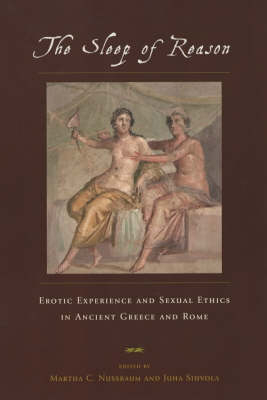
The Sleep of Reason
Erotic Experience and Sexual Ethics in Ancient Greece and Rome
Seiten
2002
University of Chicago Press (Verlag)
978-0-226-60915-7 (ISBN)
University of Chicago Press (Verlag)
978-0-226-60915-7 (ISBN)
Sex is beyond reason, and yet we constantly reason about it. So, too, did the peoples of Ancient Greece and Rome.This work considers how erotic experience is understood in classical texts, and what ethical and philosophical arguments are made about sex?
Sex is beyond reason, and yet we constantly reason about it. So, too, did the peoples of ancient Greece and Rome. But until recently there has been little discussion of their views on erotic experience and sexual ethics. The Sleep of Reason brings together an international group of philosophers, philologists, literary critics, and historians to consider two questions normally kept separate: how is erotic experience understood in classical texts of various kinds, and what ethical judgments and philosophical arguments are made about sex? From same-sex desire to conjugal love, and from Plato and Aristotle to the Roman Stoic Musonius Rufus, the contributors demonstrate the complexity and diversity of classical sexuality. They also show that the ethics of eros, in both Greece and Rome, shared a number of commonalities: a focus not only on selfmastery, but also on reciprocity; a concern among men not just for penetration and display of their power, but also for being gentle and kind, and for being loved for themselves; and that women and even younger men felt not only gratitude and acceptance, but also joy and sexual desire.
Sex is beyond reason, and yet we constantly reason about it. So, too, did the peoples of ancient Greece and Rome. But until recently there has been little discussion of their views on erotic experience and sexual ethics. The Sleep of Reason brings together an international group of philosophers, philologists, literary critics, and historians to consider two questions normally kept separate: how is erotic experience understood in classical texts of various kinds, and what ethical judgments and philosophical arguments are made about sex? From same-sex desire to conjugal love, and from Plato and Aristotle to the Roman Stoic Musonius Rufus, the contributors demonstrate the complexity and diversity of classical sexuality. They also show that the ethics of eros, in both Greece and Rome, shared a number of commonalities: a focus not only on selfmastery, but also on reciprocity; a concern among men not just for penetration and display of their power, but also for being gentle and kind, and for being loved for themselves; and that women and even younger men felt not only gratitude and acceptance, but also joy and sexual desire.
Martha C. Nussbaum is Ernst Freund Distinguished Service Professor of Law and Ethics at the University of Chicago. She is the author of numerous works, including Women and Human Development, Cultivating Humanity, and Upheavals of Thought, Juha Sihvola is professor of history at the University of Jyvaskyla, Finland. He is the author of Decay, Progress, and the Good Life?, and Hesiod and Protagoras on the Development of Culture, and the editor of Ancient Scepticism and the Scepticist Tradition.
| Erscheint lt. Verlag | 15.7.2002 |
|---|---|
| Sprache | englisch |
| Maße | 15 x 23 mm |
| Gewicht | 680 g |
| Themenwelt | Sachbuch/Ratgeber ► Gesundheit / Leben / Psychologie ► Partnerschaft / Sexualität |
| Geschichte ► Allgemeine Geschichte ► Vor- und Frühgeschichte | |
| Sozialwissenschaften ► Soziologie ► Gender Studies | |
| ISBN-10 | 0-226-60915-4 / 0226609154 |
| ISBN-13 | 978-0-226-60915-7 / 9780226609157 |
| Zustand | Neuware |
| Haben Sie eine Frage zum Produkt? |
Mehr entdecken
aus dem Bereich
aus dem Bereich
auf den Spuren der frühen Zivilisationen
Buch | Hardcover (2023)
C.H.Beck (Verlag)
CHF 27,95
Konzepte – Methoden – Theorien
Buch | Softcover (2024)
UTB (Verlag)
CHF 55,85
Was Pompeji über uns erzählt
Buch | Hardcover (2023)
Propyläen (Verlag)
CHF 44,75


